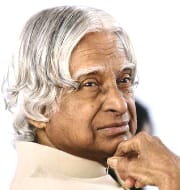NASA Names New Species After Abdul Kalam
NASA has named a new bacteria discovered on the filters of the International Space Station, ISS, as Solibacillus kalamii to honour the late president Dr A P J Abdul Kalam. The genus is Solibacillus and the species name is kalamii. Researchers at the Jet Propulsion Laboratory has found that the bacteria remained on board the International Space Station for 40 months. The new organism is found only on the ISS and has not been found anywhere on the earth. In 1963, Dr. Kalam had his early training at NASA before setting up India’s first rocket launching facility at Thumba in Kerala.
A.P.J. Abdul Kalam
Avul Pakir Jainulabdeen (A.P.J) Abdul Kalam was born on 15 October 1931 in Rameswaram, Ramanathapuram District of Tamil Nadu. In 1960, he had joined Defence Research and Development Organisation (DRDO) as a scientist and started his career by designing a small helicopter for the Indian Army. In 1969, he had joined India Space Research Organisation (ISRO) as the project director for India’s first indigenous satellite launch vehicle programme. Under his leadership and vision, India entered into the elite space club after Rohini satellite was place into the orbit in 1980. He was a pioneer and instrumental in development of the Polar Satellite Launch Vehicle (PSLV), India’s space workhorse. In 1980, he was appointed Chairman of Integrated Guided Missile Development Program (IGMDP) and was brain behind developing Agni and Prithvi missiles. Thus he came to be known as the Missile Man of India for his work on the development of ballistic missile. He was Chief Project Coordinator of Pokhran II Nuclear Test (Operation Shakti) which was conducted on 11 May 1998. He was the 11th President of India and was in office from 2002 to 2007. He was India’s most popular President and famously known as People’s President. He has been awarded with Bharat Ratna (1997), Padma Vibhushan (1990), Padma Bhushan (1981).
Month: Current Affairs - May, 2017


